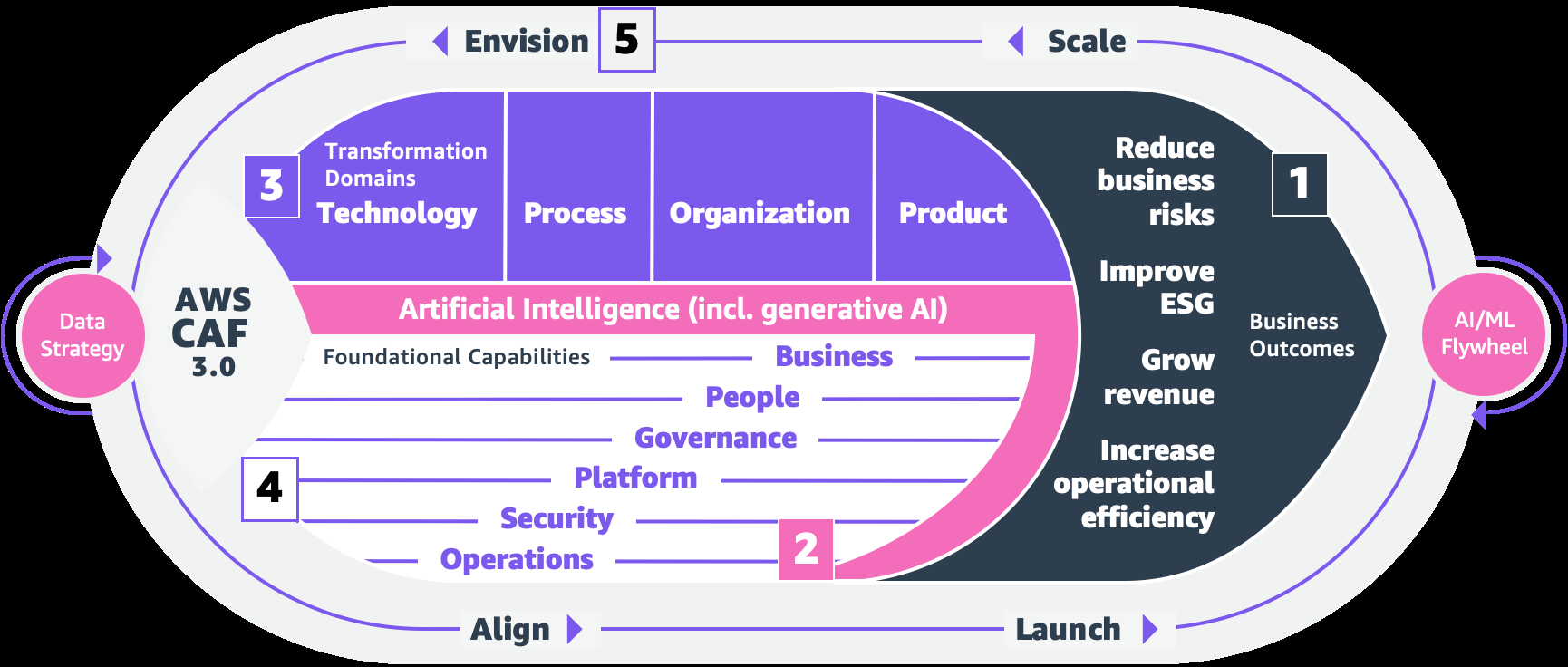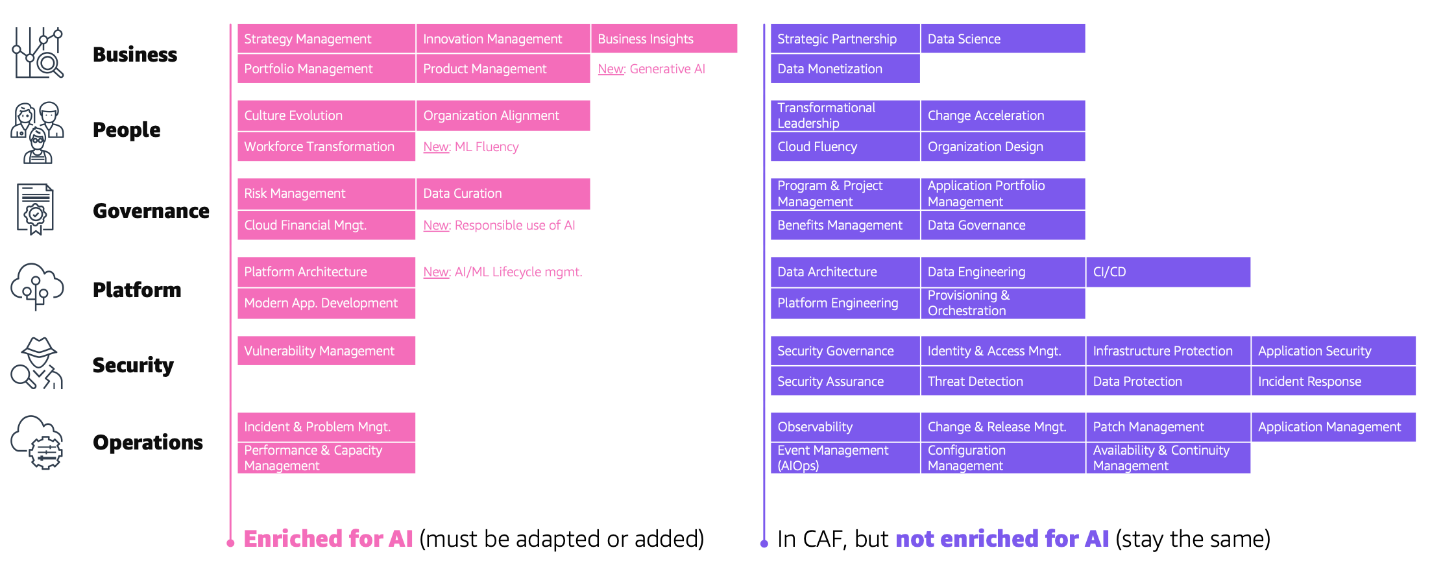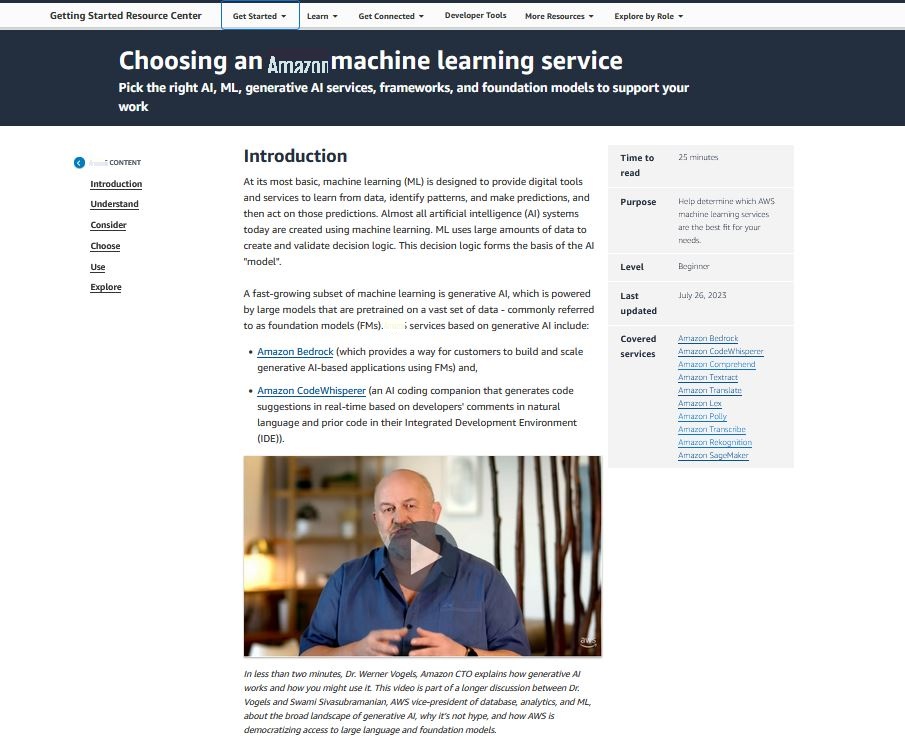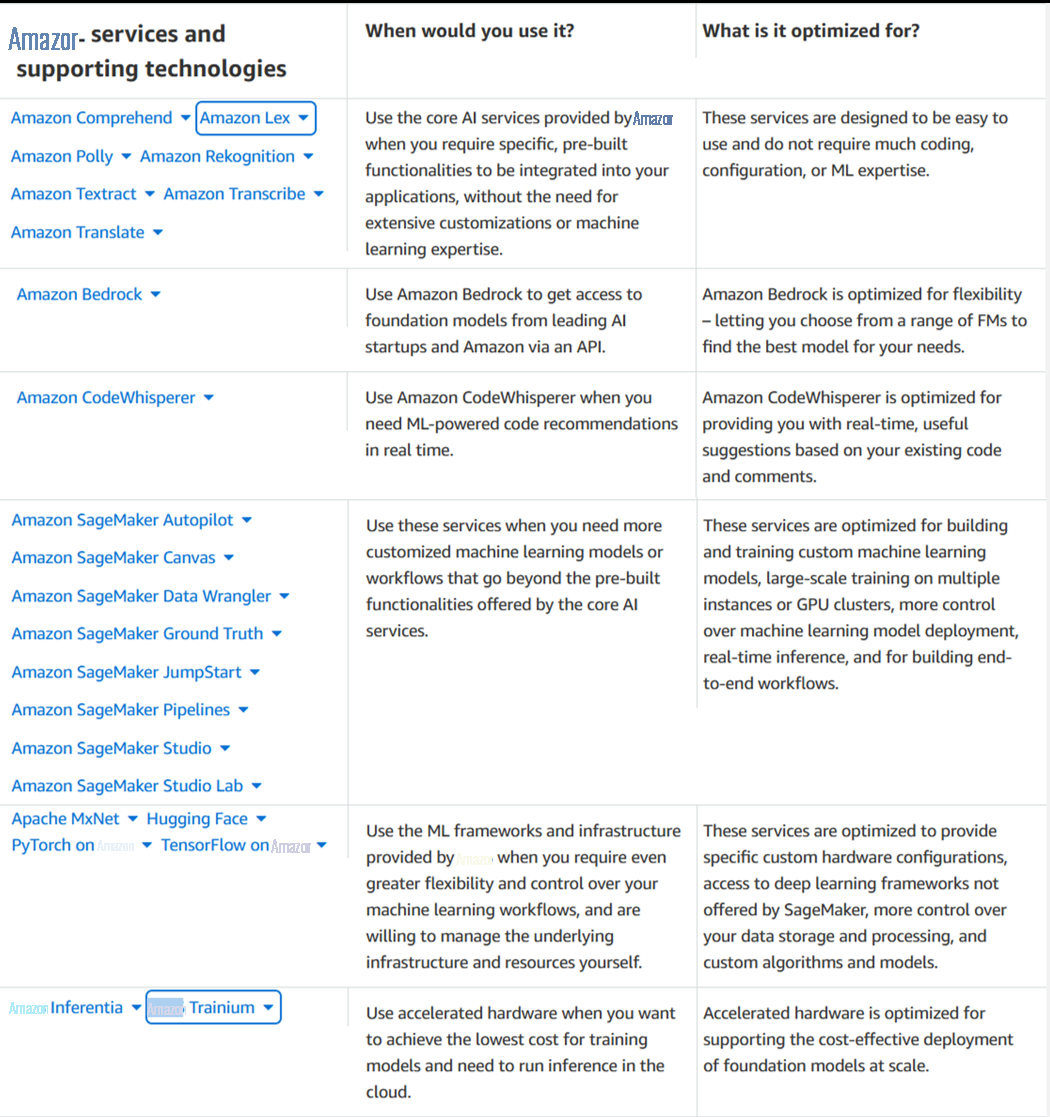我们使用机器学习技术将英文博客翻译为简体中文。您可以点击导航栏中的“中文(简体)”切换到英文版本。
亚马逊云科技 提供新的人工智能、机器学习和生成式 AI 指南,用于规划您的 AI 策略
几个月来,人工智能 (AI) 和机器学习 (ML) 的突破一直是头条新闻,这是有充分理由的。这项技术的新兴和不断发展的能力为各行各业的客户带来了新的商机。但是,这场革命的速度使组织和消费者更难评估这些突破对他们的具体意义。
多年来,亚马逊云科技 一直在大众化对人工智能、机器学习和生成式 AI 的访问和理解。通过发布有关
适用于人工智能、机器学习和生成式人工智能的 亚马逊云科技 CAF
CAF-AI 由客户和合作伙伴团队使用,可帮助制定、确定优先级、发展和传达人工智能转型战略。下图显示了我们如何通过CAF-AI简化人工智能之旅:通过评估、推导和实施人工智能战略行动项目的迭代流程(5),从业务成果(1)向后研究人工智能、机器学习和生成式人工智能提供的机会(2),跨转型领域(3)和基础能力(4)。

在 CAF-AI 中,我们描述了随着您在人工智能和机器学习方面的组织能力的成熟,您可能会经历的人工智能/机器学习之旅。为了指导您,我们将重点介绍基础能力的演变,我们观察到这些能力可以帮助组织进一步提高其在人工智能方面的成熟度。
我们还通过概述这些基础能力的目标状态来提供规范性指导,并解释如何逐步发展这些能力以在此过程中创造业务价值。下图显示了采用云和 AI/ML 的这些基本功能。 能力 是组织使用流程部署资源(例如人员、技术和其他有形或无形资产)以实现结果的能力。因为CAF-AI是一个活的知识指数,你可以预期它会随着时间的推移而成长和变化。

CAF-AI 被设计为客户机器学习和人工智能之旅的起点和定向点,旨在成为组织在制定中期人工智能和机器学习议程并努力理解影响该议程的重要主题和视角时可以从中汲取灵感的文件。根据你在人工智能/机器学习之旅中所处的位置,你可以专注于特定的部分并在那里磨练自己的技能,也可以使用整篇文档来判断成熟度并帮助指导短期的改进领域。
由于可以应用人工智能/机器学习的业务问题领域不是单一的职能或领域,因此它适用于企业的所有职能部门和所有行业领域,在这些领域,您正在寻找在人工智能/机器学习确实能带来经济差异的市场中重置竞争环境的方法。
入门资源中心机器学习决策指南
亚马逊云科技 一直以选择为中心。随着您越来越多地使用人工智能,在选择满足业务需求的最佳服务、模型和基础架构时,获得正确的支持至关重要。

决策指南还可以帮助您阐明和考虑为您的选择提供依据的标准。例如,它描述了 亚马逊云科技 ML 服务的范围(参见以下屏幕截图),每种服务都可满足不同级别的管理要求,具体取决于您需要的控制和自定义程度。

该指南还解释了 亚马逊云科技 服务在实现基础模型的力量方面的独特能力,以及您可以在哪里充分利用这个快速发展的机器学习分支。
它提供了有关特定服务的详细信息、详细的服务级别技术指南的链接、突出关键服务独特功能的比较表以及选择 AI 和 ML 服务的标准。它还提供了一组指向关键资源的精选链接,可以帮助您开始在 亚马逊云科技 上使用 AI、ML 和生成式 AI 服务。
如果您想了解 亚马逊云科技 提供的 AI、ML 和生成式 AI 产品的广度,则本决策指南是一个不错的起点。
结论
作者简介
 Caleb Wilkinson
在构建 AI 解决方案方面 拥有十多年的经验。作为 亚马逊云科技 的高级机器学习策略师,Caleb 开创了 AI 创新应用程序,这些应用突破了可能性的界限,帮助组织负责任地从人工智能中受益。他是《CAF-AI》的合著者。
Caleb Wilkinson
在构建 AI 解决方案方面 拥有十多年的经验。作为 亚马逊云科技 的高级机器学习策略师,Caleb 开创了 AI 创新应用程序,这些应用突破了可能性的界限,帮助组织负责任地从人工智能中受益。他是《CAF-AI》的合著者。
 亚历山大·沃尔克
在人工智能和机器学习领域 拥有十年的经验。他是亚马逊云科技生成式人工智能创新中心的高级机器学习策略师和技术产品经理。他与大型组织合作制定人工智能战略,并帮助他们在技术发展的前沿承担经过计算的风险。他是《CAF-AI》的合著者。
亚历山大·沃尔克
在人工智能和机器学习领域 拥有十年的经验。他是亚马逊云科技生成式人工智能创新中心的高级机器学习策略师和技术产品经理。他与大型组织合作制定人工智能战略,并帮助他们在技术发展的前沿承担经过计算的风险。他是《CAF-AI》的合著者。
 Geof Wheelwright
管理 亚马逊云科技 决策内容小组,该团队在 亚马逊云科技 入门资源中心撰写和开发越来越多的决策指南。他的团队创建了《选择 亚马逊云科技 机器学习决策指南》。自从20世纪80年代初首次接触简单的、基于文本的Apple II
Geof Wheelwright
管理 亚马逊云科技 决策内容小组,该团队在 亚马逊云科技 入门资源中心撰写和开发越来越多的决策指南。他的团队创建了《选择 亚马逊云科技 机器学习决策指南》。自从20世纪80年代初首次接触简单的、基于文本的Apple II
*前述特定亚马逊云科技生成式人工智能相关的服务仅在亚马逊云科技海外区域可用,亚马逊云科技中国仅为帮助您发展海外业务和/或了解行业前沿技术选择推荐该服务。